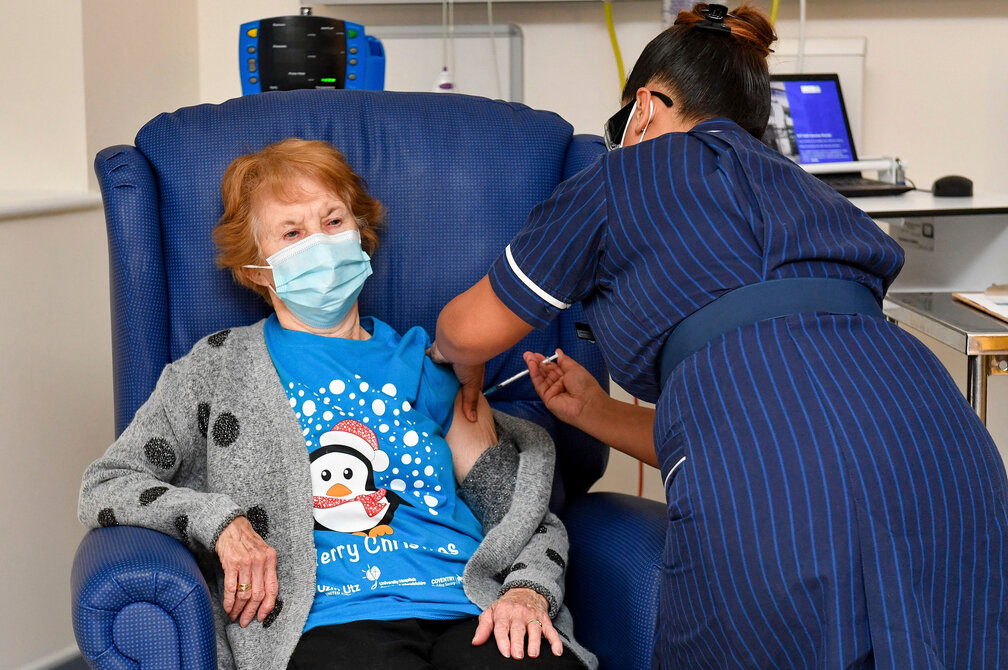How Gates and Bloomberg Are Supporting the Daunting Rollout of the COVID-19 Vaccines
/Margaret Keenan, 90, was the first patient in the UK to receive the Pfizer-BioNTech COVID-19 vaccine. Alex Gakos/shutterstock
Now that three COVID-19 vaccines have been developed, with two approved and in use in the U.S., the next challenge is to ensure they are widely distributed and that people get the shots. This is both a challenge of logistics and public education.
The two approved vaccines—from Pfizer/BioNtech and Moderna—each require two shots a few weeks apart, so that’s hundreds of millions of shots in the U.S. and billions worldwide. To make a tough job even harder, some people are reluctant to get vaccines, despite strong data showing their effectiveness and safety.
In the U.S., a big share of the distribution needs will be addressed by the federal government’s newly passed $900 billion coronavirus relief package, which includes as much as $9 billion for vaccine distribution. But philanthropy still has a part to play in the vaccination effort, both in the U.S. and around the world.
The Gates Foundation has been out front on vaccine-related work for years, including through its support for the creation of Gavi, the international organization that has worked to immunize hundreds of millions of kids in low-income countries around the world. In fact, it was the realization that 500,000 children in poorer nations were dying of rotavirus every year that partly inspired Bill and Melinda Gates to establish the foundation in 1994.
In early 2020, in the first months of the coronavirus pandemic, the Gates Foundation was among the first givers for coronavirus vaccine development efforts, and earlier this month, the Gates organization announced another $250 million to fight the coronavirus pandemic, which includes money for the equitable global delivery of COVID-19 vaccines and other medical support. This latest sum brings Gates’ total coronavirus-related commitments to $1.75 billion.
“Fair access to vaccines is part of our origin story,” wrote Gates Foundation CEO Mark Suzman. “One of Bill and Melinda’s first big philanthropic acts was to help create Gavi, the organization that works with low-income countries to immunize hundreds of millions of kids. Part of today’s $250 million commitment will go toward funding a similar delivery operation for COVID-19 drugs and vaccines.”
The challenges of distributing COVID-19 vaccines in poorer countries with less extensive public health resources puts millions of people at risk from coronavirus infection. “We are confident that the world will get better in 2021,” said Melinda Gates, co-chair of the foundation, in an announcement of the latest funding. “(B)ut whether it gets better for everyone depends on the actions of the world’s leaders and their commitment to deliver tests, treatments and vaccines to the people who need them, no matter where they live or how much money they have.”
The Gates funding will involve global health partners, including Gavi, the Vaccine Alliance and the Global Fund, in an effort to get vaccines (among other medical tools) to people everywhere.
In a public health challenge of this magnitude, there is plenty of need for philanthropy to address issues that might hinder the vaccination process in the U.S., as well. These issues include fears and concerns about vaccines, including myths and misunderstanding.
On the same day as the Gates announcement of its $250 million commitment, Bloomberg Philanthropies announced a new partnership with the U.S. Conference of Mayors to help U.S. cities prepare for the vaccine rollout. Bloomberg says the partnership is the latest step in a now year-long effort to help local officials address the COVID-19 pandemic. This hits a few sweet spots for this funder, with its focus on public health and its strategy of supporting municipal leadership.
The program will focus on supporting local officials in three areas, including resident engagement, guidance on vaccine administration, and updates on vaccine development and distribution.
Getting the message out to the public is a central goal. “Distributing these vaccines and building confidence in them is the last big hurdle to ending this health and economic crisis and returning to our way of life,” said Tom Cochran, CEO and executive director of the U.S. Conference of Mayors, in an announcement of the partnership with Bloomberg.









